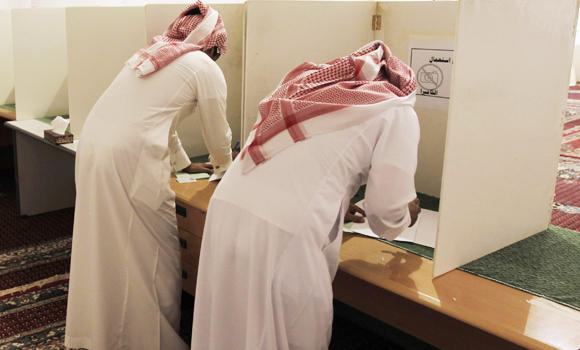
403
Sorry!!
Error! We're sorry, but the page you were looking for doesn't exist.
Academics compete with businessmen in municipal elections
(MENAFN- Arab News) JEDDAH: The third Saudi municipal elections will make a historical change.
Setting a precedent more candidates from academia are joining this round unlike the previous two editions where most candidates were in the business or social activism sectors.
In the holy capital a 70 percent majority of male and female candidates so far come from the education sector both from the university level and public education. Against the norm the business sector revealed low enthusiasm in running for these public posts.
Sources believe that these sectors' eagerness to take part in public work shows a real will toward developing municipal services and changing the stereotypical view of local council work. 'Workers in the education sector are usually more experienced when it comes to society's needs more than other sectors as they have a greater and more direct interaction with members of the community from different groups and ages' the source continued.
Some believe that workers in the education sector can devote more time to public work because most of their working hours take place early in the day which gives them the needed time to serve the community and feel their demands and problems.
In Madinah however there was a notable presence of housewives among the list of candidates which included categories from different sectors in the community.
Sources described the variety in the list of candidates as a positive change stating they need to have a council from different experiences and sectors which can help make a drastic change in the quality of services that members need in their neighborhoods.
Observers say that the change of the regulations for municipal councils has encouraged more people to nominate themselves because they believe they have the ability to work hard in order to develop society.
Mishal Al-Dosari mayor of Al-Hamra and Andalus neighborhoods in Jeddah said that he noted a real movement from different sectors and age groups in this electoral round adding that the reason behind this is the drastic change and reforms in municipal council regulations.
'The monitoring role granted to municipal councils whether the mayoralties or all vital facilities has contributed to people's eagerness to join public work' he said adding that the lack of this role led to disappointment in the experience of the first round's role which negatively affected participation in the second cycle.
Setting a precedent more candidates from academia are joining this round unlike the previous two editions where most candidates were in the business or social activism sectors.
In the holy capital a 70 percent majority of male and female candidates so far come from the education sector both from the university level and public education. Against the norm the business sector revealed low enthusiasm in running for these public posts.
Sources believe that these sectors' eagerness to take part in public work shows a real will toward developing municipal services and changing the stereotypical view of local council work. 'Workers in the education sector are usually more experienced when it comes to society's needs more than other sectors as they have a greater and more direct interaction with members of the community from different groups and ages' the source continued.
Some believe that workers in the education sector can devote more time to public work because most of their working hours take place early in the day which gives them the needed time to serve the community and feel their demands and problems.
In Madinah however there was a notable presence of housewives among the list of candidates which included categories from different sectors in the community.
Sources described the variety in the list of candidates as a positive change stating they need to have a council from different experiences and sectors which can help make a drastic change in the quality of services that members need in their neighborhoods.
Observers say that the change of the regulations for municipal councils has encouraged more people to nominate themselves because they believe they have the ability to work hard in order to develop society.
Mishal Al-Dosari mayor of Al-Hamra and Andalus neighborhoods in Jeddah said that he noted a real movement from different sectors and age groups in this electoral round adding that the reason behind this is the drastic change and reforms in municipal council regulations.
'The monitoring role granted to municipal councils whether the mayoralties or all vital facilities has contributed to people's eagerness to join public work' he said adding that the lack of this role led to disappointment in the experience of the first round's role which negatively affected participation in the second cycle.

Legal Disclaimer:
MENAFN provides the
information “as is” without warranty of any kind. We do not accept
any responsibility or liability for the accuracy, content, images,
videos, licenses, completeness, legality, or reliability of the information
contained in this article. If you have any complaints or copyright
issues related to this article, kindly contact the provider above.


















Comments
No comment